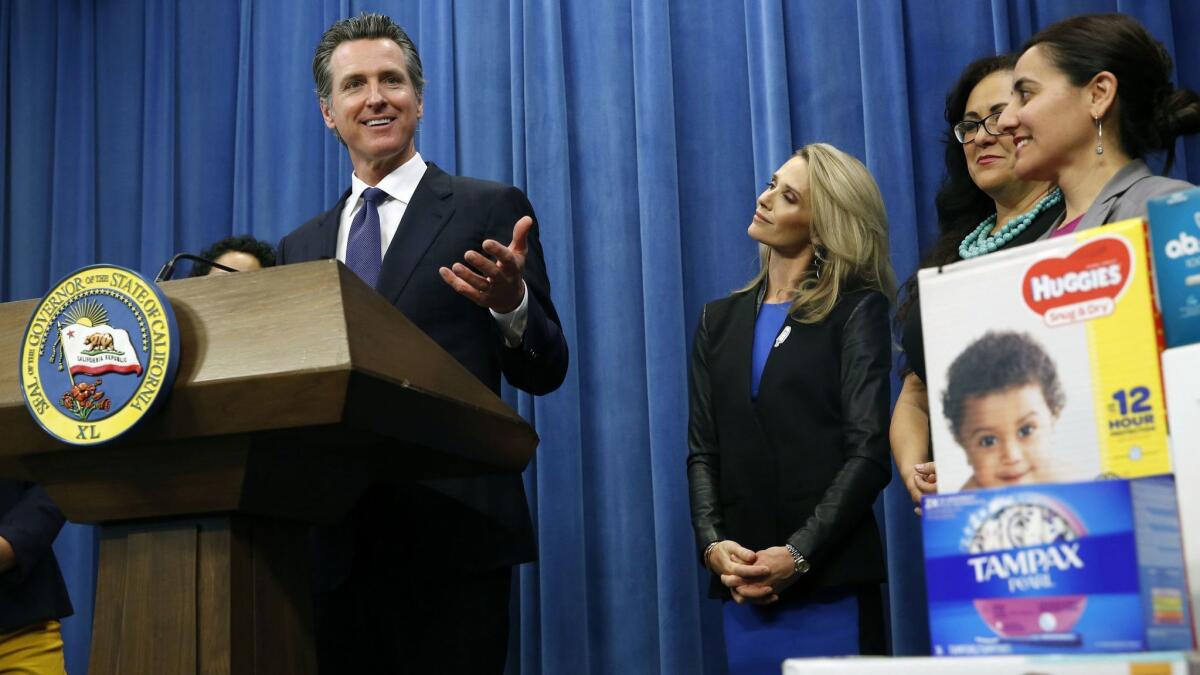No more sales taxes on diapers and tampons under Gov. Gavin Newsom’s proposed budget

Reporting from Sacramento — Embracing an idea advocates say will help struggling California women and families, Gov. Gavin Newsom on Tuesday proposed a five-year elimination of sales taxes on purchases of diapers and menstrual products — proposals that his predecessor rejected.
Newsom, who will submit a revised state budget to the Legislature on Thursday, said he will also double the size of his earlier proposal to create a new income tax credit for low-income parents. And he said he will seek to expand an array of child care services, some of which would be funded by taxes collected on the sale of legalized marijuana.
“There’s a deep agenda here and I hope you’re hearing it,” Newsom said at a midday news conference in Sacramento. “An agenda on affordability, an agenda on the cost crisis and an agenda to support parents.”
Gov. Gavin Newsom faces a big political test as he shapes his first California budget »
The costs for the proposals ranged from the tens of millions of dollars in lost tax revenues to upward of a half-billion dollars for tax credits beyond what now exists for families with meager incomes. The full impact will be included in the governor’s revised budget.
Legislators must send him a final spending plan by June 15 for the state’s new fiscal year, which begins on July 1.
That Newsom is embracing a mix of additional tax cuts and spending reflects the better-than-expected tax collections of April, when preliminary numbers show an almost $1-billion boost to what’s believed to be California’s largest-ever tax revenue windfall.
His new budget will call for eliminating taxes on diapers for newborns and toddlers. Similar legislation now pending in the state Assembly projects the resulting loss of sales tax revenues at $35 million a year. Local governments, which impose their own sales tax in addition to the state levy, could collectively lose about the same amount.
Newsom also proposed eliminating sales taxes on tampons, sanitary napkins, menstrual sponges and menstrual cups. Those lost revenues would total almost $9 million a year, according to a recent Assembly analysis of a bill that seeks to remove those taxes.
“We can afford to do that and it’s the right thing to do,” he said of exempting those products from sales taxes.
Neither proposal, though, is permanent. Similar to pending legislation, a spokesman for the governor confirmed that both sales tax repeals would begin in January and would expire in 2025 unless additional action is taken by lawmakers.
Both efforts have long been a priority of the Legislative Women’s Caucus but ran into stiff opposition from then-Gov. Jerry Brown, who vetoed bills to eliminate the taxes in 2016.
“Tax breaks are the same as new spending — they both cost the General Fund money,” Brown wrote in his veto message for the tax-free diaper and tampon proposals.
Newsom’s decision to plot a different course is part of a larger effort he argues is aimed at California’s struggling families. The governor also pledged on Tuesday to boost child care for the neediest of families enrolled in the state’s welfare assistance program, CalWorks. And he said his revised budget plan would offer a tax credit for low-income families with children under the age of 6 of up to $1,000, thus doubling a proposal Newsom made in January.
Assemblywoman Lorena Gonzalez (D-San Diego), the author of legislation to eliminate sales taxes on infant and toddler diapers sold in the state, praised Newsom’s endorsement of the plan.
“This is something that will affect every single parent in California,” she said. “That’s substantive and that’s meaningful.”
Gonzalez estimated families now pay as much as $120 a year in sales taxes on diapers, enough to pay for another month’s supply. Low-income families, she said, leave children unchanged for longer periods or re-use disposable diapers to cut down on the cost.
Of the various proposals Newsom has newly embraced, the expanded child tax credit for low-income families would likely be the most expensive. A recent report by the nonpartisan Legislative Analyst’s Office projected a new $500 child tax credit — what the governor proposed in January — would lower state tax revenues by $240 million a year. It was not immediately clear whether the proposal announced Tuesday would double that cost.
While several of the proposals endorsed by the governor have been under discussion for years, the most novel part of his announcement was the intent to use tax dollars collected from the sale of marijuana for child care programs. The services would be available for children up to the age of 12 and administered by the California Department of Education.
Proposition 64, approved by voters in 2016, states that revenues from the sale of marijuana may be spent only on government programs “that further the purpose” of the law. To date, that’s largely been on drug research and law enforcement efforts. A spokesman for Newsom pointed to a study by the National Institutes of Health citing the link between early childhood care and substance abuse prevention later in life. The governor was a principal proponent of the marijuana legalization initiative.
Newsom broadly called the set of new budget proposals a “parents agenda” that reflects the challenges millions of Californians face because of the state’s high cost of living. He was joined at the event by his wife, First Partner Jennifer Siebel Newsom, who noted the issue resonates with the couple as they raise their four young children.
“Nothing is more important than our children’s futures,” Siebel Newsom said. “We are fighting for a future where our daughters will be valued equally to our sons, a California where every single child, no matter the ZIP Code or the family that they’re born into will have the best possible start in life. And a California where every parent will have the support they need to build the best possible future for their children.”
Follow @johnmyers on Twitter and sign up for our daily Essential Politics newsletter
More to Read
Get the L.A. Times Politics newsletter
Deeply reported insights into legislation, politics and policy from Sacramento, Washington and beyond. In your inbox three times per week.
You may occasionally receive promotional content from the Los Angeles Times.











